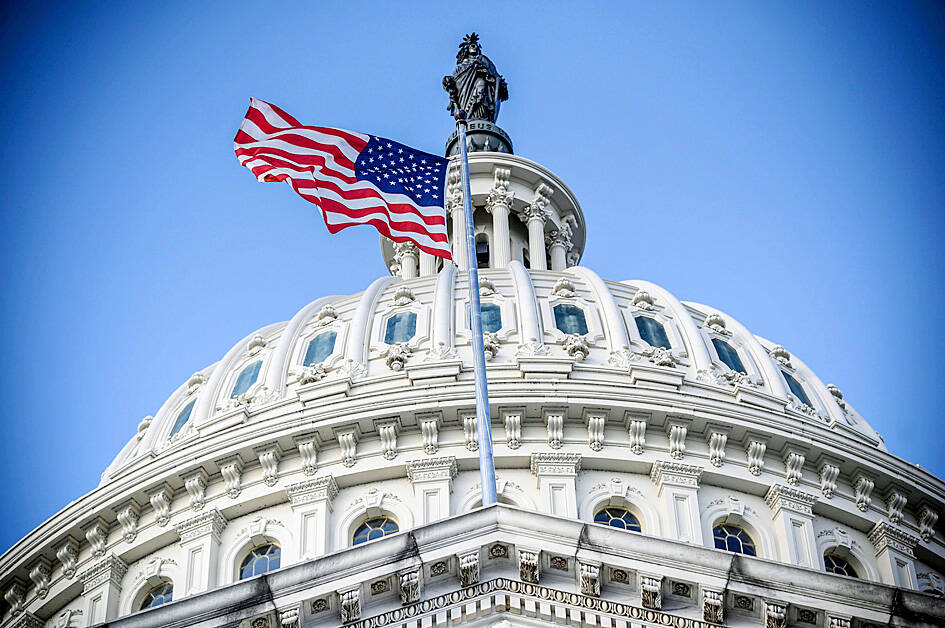The US Senate Committee on Foreign Relations is on Wednesday to deliberate on the Taiwan Policy Act of 2022.
The deliberations were originally scheduled to take place on July 9, but were postponed to Sept. 3 after some Republican senators requested more time to study the bill. It was further postponed as the US Senate first handled Finland’s and Sweden’s NATO membership applications.
Robert Sutter, a professor of international affairs at George Washington University, in an article published in The Diplomat on Saturday said that bipartisan majorities in both chambers of the US Congress indicate support for Taiwan.

Photo: AFP
“Supporting Taiwan as an important partner in dealing with these challenges [from China] remains a high priority,” he wrote.
China increased military exercises around Taiwan after US House of Representatives Speaker Nancy Pelosi visited Taipei early last month.
However, that did not deter further US congressional visits to Taipei or efforts by the administration of US President Joe Biden to foster closer ties with Taiwan, he wrote.
The bill calls for “more symbolic moves in the legislation,” such as renaming Taiwan’s de facto embassy in Washington from the “Taipei Economic and Cultural Representative Office” to the “Taiwan Representative Office,” Newsweek reported on Thursday.
It also proposes changing the title “American Institute in Taiwan [AIT] director” to “AIT representative,” the appointment of which would require Senate confirmation similar to ambassadorial appointments.
The US might also designate Taiwan a “major non-NATO ally,” as it has done for Australia, Israel, Japan and South Korea, to facilitate arms sales, the magazine reported.
Although some elements of the bill might be discarded, the US is “unlikely to halt future debate” on its Taiwan policies, as China has been increasing pressure on Taiwan, Newsweek reported.
US National Security Adviser Jake Sullivan has told reporters that “some of the contents [of the bill] made us worried.”
Kuo Yu-jen (郭育仁), a professor at National Sun Yat-sen University’s Institute of China and Asia-Pacific Studies, on Saturday said that the US Congress appears to be seeking “pre-emptive preparedness” with the bill.
Each Taiwan-friendly act the US passes would serve as a legal basis for its administration to formulate policies, most of which are “compliant with the baseline,” he said.
It is therefore reasonable for Sullivan to worry about the bill, as some of its provisions might exceed the baseline established in the past, he added.
The US executive branch might be concerned that the bill would prompt China to take an even stronger stance against Taiwan in the “overall strategy for resolving the Taiwan dilemma in the new era,” which China plans to propose during the 20th National Congress of the Chinese Communist Party next month, he said.
However, it is because of Beijing’s tough measures that the US Congress proposed the bill, which seeks to bolster US strategies according to changes in the relationship between the US, Taiwan and China, he said.

ENDEAVOR MANTA: The ship is programmed to automatically return to its designated home port and would self-destruct if seized by another party The Endeavor Manta, Taiwan’s first military-specification uncrewed surface vehicle (USV) tailor-made to operate in the Taiwan Strait in a bid to bolster the nation’s asymmetric combat capabilities made its first appearance at Kaohsiung’s Singda Harbor yesterday. Taking inspiration from Ukraine’s navy, which is using USVs to force Russia’s Black Sea fleet to take shelter within its own ports, CSBC Taiwan (台灣國際造船) established a research and development unit on USVs last year, CSBC chairman Huang Cheng-hung (黃正弘) said. With the exception of the satellite guidance system and the outboard motors — which were purchased from foreign companies that were not affiliated with Chinese-funded

PERMIT REVOKED: The influencer at a news conference said the National Immigration Agency was infringing on human rights and persecuting Chinese spouses Chinese influencer “Yaya in Taiwan” (亞亞在台灣) yesterday evening voluntarily left Taiwan, despite saying yesterday morning that she had “no intention” of leaving after her residence permit was revoked over her comments on Taiwan being “unified” with China by military force. The Ministry of the Interior yesterday had said that it could forcibly deport the influencer at midnight, but was considering taking a more flexible approach and beginning procedures this morning. The influencer, whose given name is Liu Zhenya (劉振亞), departed on a 8:45pm flight from Taipei International Airport (Songshan airport) to Fuzhou, China. Liu held a news conference at the airport at 7pm,

GRIDLOCK: The National Fire Agency’s Special Search and Rescue team is on standby to travel to the countries to help out with the rescue effort A powerful earthquake rocked Myanmar and neighboring Thailand yesterday, killing at least three people in Bangkok and burying dozens when a high-rise building under construction collapsed. Footage shared on social media from Myanmar’s second-largest city showed widespread destruction, raising fears that many were trapped under the rubble or killed. The magnitude 7.7 earthquake, with an epicenter near Mandalay in Myanmar, struck at midday and was followed by a strong magnitude 6.4 aftershock. The extent of death, injury and destruction — especially in Myanmar, which is embroiled in a civil war and where information is tightly controlled at the best of times —

Taiwan was ranked the fourth-safest country in the world with a score of 82.9, trailing only Andorra, the United Arab Emirates and Qatar in Numbeo’s Safety Index by Country report. Taiwan’s score improved by 0.1 points compared with last year’s mid-year report, which had Taiwan fourth with a score of 82.8. However, both scores were lower than in last year’s first review, when Taiwan scored 83.3, and are a long way from when Taiwan was named the second-safest country in the world in 2021, scoring 84.8. Taiwan ranked higher than Singapore in ninth with a score of 77.4 and Japan in 10th with